
JIAX SEMANAL 2 mg/ml ORAL SOLUTION
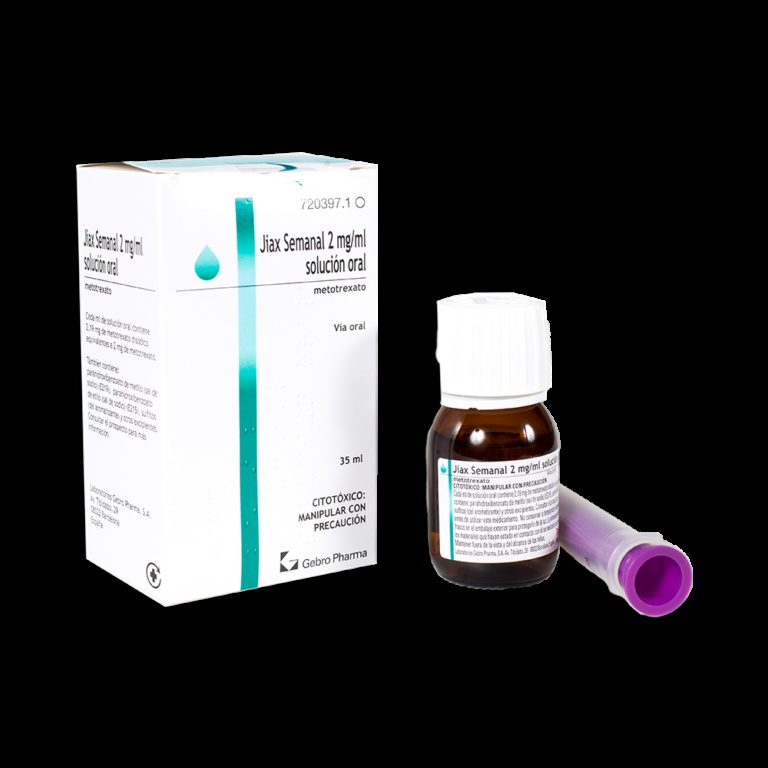

How to use JIAX SEMANAL 2 mg/ml ORAL SOLUTION
Translated with AI
This page provides general information and does not replace a doctor’s consultation. Always consult a doctor before taking any medication. Seek urgent medical care if symptoms are severe.
Show originalContents of the leaflet
Introduction
Package Leaflet: Information for the Patient
Jiax Weekly 2mg/ml Oral Solution
Methotrexate
DO NOT EXCEED THE RECOMMENDED DOSE PRESCRIBED BY YOUR DOCTOR. THE DOSE SHOULD BE ADMINISTERED ONCE A WEEK. DEATHS HAVE BEEN REPORTED WITH THE DAILY ADMINISTRATION OF THIS MEDICINE INSTEAD OF WEEKLY. CONSULT YOUR DOCTOR OR PHARMACIST IF YOU ARE NOT SURE ABOUT THE DOSE OR FREQUENCY OF ADMINISTRATION OF THIS MEDICINE. |
Read the entire package leaflet carefully before starting to take this medicine, as it contains important information for you.
- Keep this package leaflet, as you may need to read it again.
- If you have any questions, consult your doctor, pharmacist, or nurse.
- This medicine has been prescribed to you only, and you should not give it to others, even if they have the same symptoms as you, as it may harm them.
- If you experience side effects, consult your doctor, pharmacist, or nurse, even if they are not listed in this package leaflet. See section 4.
Contents of the Package Leaflet
- What is Jiax Weekly and what is it used for
- What you need to know before taking Jiax Weekly
- How to take Jiax Weekly
- Possible side effects
- Storage of Jiax Weekly
- Package Contents and Additional Information
1. What is Jiax Weekly and what is it used for
Methotrexate is the active ingredient in Jiax Weekly. It works by reducing inflammation or swelling and the activity of the immune system (the body's defense mechanism). The overactivity of the immune system has been linked to the presence of inflammatory diseases.
Low doses of Jiax Weekly are indicated for:
- Treating active and severe polyarticular juvenile idiopathic arthritis (when five or more joints are affected) after the failure of non-steroidal anti-inflammatory drugs (NSAIDs).
2. What you need to know before taking Jiax Weekly
Consult your doctor about the risks and benefits of treatment with methotrexate before starting to take this medicine. Follow your doctor's instructions for administering methotrexate exactly. You may experience side effects and even death if you take methotrexate more frequently or in higher doses than prescribed by your doctor.
Do not take Jiax Weekly:
- If you are allergic to methotrexate or any of the other components of this medicine (listed in section 6).
- If you are pregnant, breastfeeding, or planning to become pregnant (see section "Pregnancy, Breastfeeding, and Fertility").
- If you have liver disease (liver failure) or severe kidney disease (kidney failure).
- If you have liver damage due to excessive alcohol consumption (alcoholic hepatopathy), chronic liver damage (chronic hepatopathy), or if you drink excessive amounts of alcohol.
- If you have an immune system disorder (immunodeficiency syndrome).
- If you have abnormal levels of red blood cells, white blood cells, or platelets in your blood.
- If you have ulcers in the mouth, stomach, or intestine.
- If you have a severe infection.
- If you need to be vaccinated.
Warnings and Precautions
Important Warning about Jiax Weekly Dosage (Methotrexate):
This oral solution contains 2mg of methotrexate in 1ml of solution, and the dosing syringe is graduated in ml, not mg.
Take Jiax Weekly only once a weekfor the treatment of juvenile idiopathic arthritis.
Taking too much Jiax Weekly (methotrexate) can be fatal.
Read section 3 of this package leaflet carefully.
If you have any questions, consult your doctor or pharmacist before taking this medicine.
Consult your doctor, pharmacist, or nurse before starting to take Jiax Weekly:
- If you have diabetes mellitus treated with insulin.
- If you have chronic inactive infections (e.g., tuberculosis, hepatitis B or C, zoster [herpes zoster]) as new episodes may occur.
- If you have had kidney or liver disease.
- If you have lung function problems.
- If you are significantly overweight.
- If you have abnormal fluid accumulation in the abdomen (ascites) or around the lungs (pleural effusions).
- If you are dehydrated or have conditions that cause dehydration (vomiting, diarrhea, constipation, inflammation of the mouth mucosa).
Acute pulmonary hemorrhage has been reported with methotrexate in patients with underlying rheumatologic disease. If you cough up blood or spit up blood, you should contact your doctor immediately.
If you have had skin problems after radiation therapy (radiation dermatitis) or sunburn, as these reactions may recur after treatment with methotrexate (memory reaction).
Patients receiving low-dose methotrexate may experience lymph node enlargement (lymphoma) and, in such cases, treatment should be discontinued.
Diarrhea can be a possible side effect of Jiax Weekly and requires discontinuation of treatment. If you experience diarrhea, consult your doctor.
Certain brain disorders (encephalopathy/leukoencephalopathy) have been reported in cancer patients receiving methotrexate. These side effects cannot be ruled out when using methotrexate to treat other diseases.
If you, your partner, or your caregiver notice the onset or worsening of neurological symptoms, such as general muscle weakness, vision changes, changes in thinking, memory, and orientation that cause confusion and changes in personality, contact your doctor immediately, as these may be symptoms of a rare and severe brain infection called progressive multifocal leukoencephalopathy (PML).
Skin changes in psoriasis cases may worsen during treatment with methotrexate in cases of UV light exposure.
Methotrexate can make your skin more sensitive to sunlight. Avoid intense sun exposure and do not use sunbeds or UV lamps without medical advice. To protect your skin from intense sun exposure, wear suitable clothing or use a sunscreen with a high protection factor.
Special Precautions for Treatment with Jiax Weekly
Methotrexate temporarily affects sperm and egg production, which is reversible in most cases. Methotrexate can cause abortions and severe birth defects. If you are a woman, you should avoid becoming pregnant while using methotrexate and for at least 6 months after stopping treatment. If you are a man, you should avoid fathering a child if you are receiving methotrexate and for at least 3 months after stopping treatment. See also section "Pregnancy, Breastfeeding, and Fertility".
Recommended Follow-up Examinations and Precautions
Even if methotrexate is used in low doses, serious side effects can occur. To detect them in time, your doctor will need to perform tests and analytical controls.
Before starting treatment:
Before starting treatment, you will have blood tests to check that you have sufficient blood cells. You will also have blood tests to check liver function and to determine if you have hepatitis. Additionally, serum albumin (a blood protein), hepatitis status, and kidney function will be monitored. Your doctor may also decide to perform other liver tests; some of these may involve liver imaging, and others may require taking a small tissue sample from the liver for further examination. Your doctor may also check for tuberculosis and may perform a chest X-ray or lung function test.
During treatment
Your doctor may perform the following examinations:
- Examination of the oral cavity and pharynx to identify changes in the mucous membrane, such as inflammation or ulceration.
- Blood tests/blood cell counts with cell count and measurement of serum methotrexate levels.
- Blood tests to monitor liver function.
- Imaging tests to monitor liver function.
- Removal of a small tissue sample from the liver for further examination.
- Blood tests to monitor kidney function.
- Monitoring of the respiratory tract and, if necessary, a lung function test.
It is very important that you attend these scheduled examinations.
If the results of any of these tests are abnormal, your doctor will adjust your treatment accordingly.
Elderly Patients
Elderly patients treated with methotrexate should be closely monitored by a doctor to detect possible side effects as soon as possible.
The age-related decline in liver and kidney function and low body reserves of folic acid in the elderly require a relatively low dose of methotrexate.
Children and Adolescents
The use of Jiax Weekly is not recommended in children under 3 years of age, as there is insufficient data on efficacy and safety in this patient group.
Other Medicines and Jiax Weekly
Tell your doctor or pharmacist if you are taking, have recently taken, or might take any other medicines.
Some medicines may interact with methotrexate. It is important that you inform your doctor if you are taking the following medicines:
- Medicines for treating certain types of cancer, such as cisplatin, mercaptopurine, cytarabine, and L-asparaginase.
- Non-steroidal anti-inflammatory drugs or salicylates (pain and/or inflammation medicines such as acetylsalicylic acid and other salicylates, diclofenac, ibuprofen, and ketoprofen).
- Proton pump inhibitors, such as omeprazol (medicines that reduce stomach acid production and are used to treat stomach acid or gastrointestinal ulcers).
- Leflunomide (used to treat arthritis).
- Medicines with high plasma protein binding capacity (including salicylates, phenylbutazone, phenytoin, sulfonamides, sulfonilureas, aminobenzoic acid, some antibiotics, and medicines for treating abnormal cholesterol and lipid levels, such as cholestyramine).
- Probenecid (a medicine used to reduce uric acid levels).
- Antibiotics (ciprofloxacin, penicillins, sulfonamides, tetracyclines, chloramphenicol, pyrimethamine, trimethoprim/sulfamethoxazole) and broad-spectrum antibiotics that are not absorbed in the gastrointestinal tract.
Penicillins may reduce the excretion of methotrexate and cause a potential increase in side effects.
- Medicines that cause liver toxicity (including leflunomide, azathioprine, sulfasalazine, and retinoids).
- Theophylline (used to treat lung problems such as asthma).
- Vitamins or vitamin supplements containing folic acid or its derivatives.
- Nitrous oxide (anesthetic).
- Amiodarone (used to treat heart diseases).
- Diuretics (such as triamterene).
- Metamizol (synonyms novaminsulfon and dipyrone) (pain and/or fever medicine).
It is not recommended to administer certain vaccines during treatment with methotrexate, such as live vaccines (e.g., measles, mumps, flu, or yellow fever vaccines).
Additionally, some treatments may interact with methotrexate, such as PUVA (methoxsalen and ultraviolet light) in patients with psoriasis or a disease known as mycosis fungoides, as well as radiation therapy.
Caution should be exercised when receiving a red blood cell transfusion during treatment with methotrexate.
Using Jiax Weekly with Food, Drinks, and Alcohol
Do not consume alcohol while taking methotrexate, as it may increase the likelihood of side effects, especially liver-related ones. Your doctor may recommend that you drink more fluids than usual. This will help eliminate the medicine from your body and prevent kidney problems.
Pregnancy, Breastfeeding, and Fertility
If you are pregnant or breastfeeding, think you may be pregnant, or plan to become pregnant, consult your doctor or pharmacistbefore using this medicine.
Consult your doctor or pharmacist before using any medicine.
Pregnancy
Do not use Jiax Weekly during pregnancy or if you are trying to become pregnant. Methotrexate can cause birth defects, harm the fetus, or cause abortions. It is associated with malformations of the skull, face, heart, and blood vessels, brain, and limbs. Therefore, it is very important that methotrexate is not administered to pregnant women or those planning to become pregnant. In women of childbearing age, any possibility of pregnancy should be excluded using appropriate measures, such as a pregnancy test before starting treatment. You should avoid becoming pregnant while taking methotrexate and for at least 6 months after stopping treatment, using reliable contraceptive methods during this time (see also section "Warnings and Precautions").
If you become pregnant during treatment or suspect you may be pregnant, consult your doctor as soon as possible. You will be provided with information about the risk of harmful effects on the child during treatment.
If you wish to become pregnant, consult your doctor, who may refer you to a specialist for information before the planned start of treatment.
Breastfeeding
It has been shown that methotrexate is excreted in breast milk, so it is contraindicated during breastfeeding.
Male Fertility
Available data do not indicate an increased risk of malformations or abortions if the father takes a methotrexate dose of less than 30 mg/week. However, this risk cannot be completely ruled out. Methotrexate can be genotoxic, meaning it can cause genetic mutations. Methotrexate can affect sperm production and cause birth defects. Therefore, you should avoid fathering a child or donating sperm while taking methotrexate and for at least 3 months after stopping treatment.
As treatment with methotrexate may cause infertility, it may be advisable for male patients to conserve their sperm before starting treatment (see also the section "Warnings and Precautions").
Driving and Using Machines
It is not recommended to drive or use machines after taking Jiax Weekly, as some of the possible side effects, such as dizziness and fatigue, may affect your ability to drive and use machines.
Jiax Weekly contains methyl parahydroxybenzoate (sodium salt), ethyl parahydroxybenzoate (sodium salt), and sulfites (flavorings).
This medicine may cause allergic reactions (possibly delayed), as it contains methyl parahydroxybenzoate, sodium salt (E219), and ethyl parahydroxybenzoate, sodium salt (E215).
Rarely, this medicine may cause hypersensitivity reactions and bronchospasm (sudden shortness of breath) because it contains sulfites.
3. How to Take Jiax Weekly
Follow your doctor's or pharmacist's administration instructions for this medication exactly. If in doubt, consult your doctor or pharmacist. You may experience side effects and even death if you take methotrexate more frequently or in larger doses than prescribed by your doctor.
Follow your doctor's administration instructions for this medication exactly. It is very important that you check if the dose has been prescribed in ml or mg.
Recommended dose:
TAKE JIAX WEEKLY ONLY ONCE A WEEK.
The initial recommended dose for juvenile idiopathic polyarticular arthritisin children and adolescents is 10-15 mg/m2 of body surface area once a weekorally. Your doctor may adjust the dose based on the response to treatment and any side effects you may experience.
How to take this medication correctly
Jiax Weekly is supplied in a 35 or 65 ml container for oral administration.
Wash your hands before and after administering a dose. If you are a parent or caregiver administering the medication, you must wear disposable gloves when handling methotrexate.
If methotrexate comes into contact with the skin, eyes, or nose, you should wash the affected area with soap and water.
Clean up any spills immediately.
Women who are pregnant, plan to become pregnant, or are breastfeeding should not handle methotrexate.
Keep this medication out of sight and reach of children, preferably in a locked cabinet. Accidental ingestion can be fatal for children.
Keep the bottle well closed to prevent loss of medication and reduce the risk of accidental spillage.
Remember that Jiax Weekly SHOULD ONLY BE ADMINISTERED ONCE A WEEK. Note the day of the week you have decided to take the medication using the space provided on the container.
IT IS VERY IMPORTANT THAT YOU TAKE THIS MEDICATION EXACTLY AS YOUR DOCTOR HAS INDICATED AND ONLY TAKE THE AMOUNT PRESCRIBED FOR YOUR ILLNESS.
You may not appreciate all the benefits of the medication until many months have passed. Do not increase the dose or take this medication more frequently or for longer than prescribed. Your illness will not improve faster. In fact, it could increase the risk of side effects, which could be potentially fatal.
How to take the oral solution: illustrated instructions
Instructions for use
- Shake the bottle.

- Open the bottle by pressing the cap down and turning it counterclockwise (Figure 1).
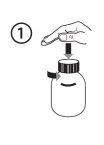
- Insert the adapter into the neck of the bottle (Figure 2).
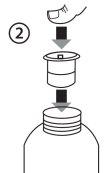
- Take the syringe and insert it into the adapter opening (Figure 3).
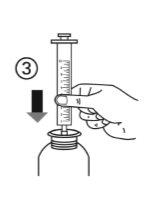
- Turn the bottle upside down (Figure 4).
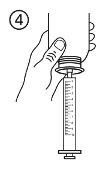
- Fill the syringe with a small amount of solution by pulling the plunger down (Figure 4A). Then, press the plunger up to eliminate any air bubbles (Figure 4B). Finally, pull the plunger down to the graduation mark corresponding to the prescribed dose in milliliters (ml). The top of the plunger should be aligned with the mark corresponding to the dose (Figure 4C).
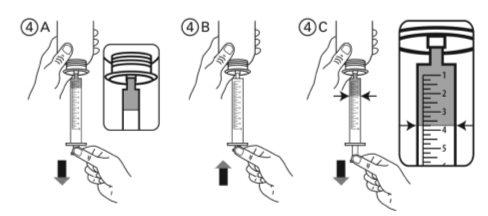
- Return the bottle to its vertical position (Figure 5A).
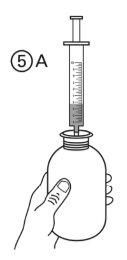
- Remove the syringe from the adapter (Figure 5B).
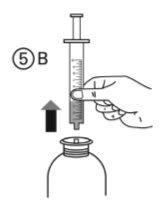
- Insert the tip of the syringe into your mouth and press the plunger slowly to administer the medication.
- Then, fill the syringe with water and take it to ensure that all the medication has been ingested.
- Next, drink a glass of water to eliminate any residue of methotrexate from your mouth and lips.
- Leave the syringe adapter in the bottle and close the bottle with the plastic cap.
- Wash the syringe with soap and warm water and rinse it well. To clean the inside of the syringe, submerge it in water and move the plunger up and down several times. Let it dry before reusing it. Keep the syringe in a clean place with the medication (Figure 6).
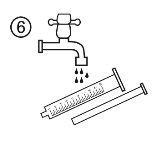
- WASH YOUR HANDS THOROUGHLYwith soap and warm water IMMEDIATELYafter use.
Use in patients with renal and hepatic disorders
Consult your doctor, as it may be necessary to adjust the dose. In some cases, the medication may be contraindicated.
If you take more Jiax Weekly than you should
If you have taken more Jiax Weekly than you should, consult your doctor or pharmacist immediately or go to the emergency department of the nearest hospital.
In case of overdose or accidental ingestion, consult the Toxicology Information Service, phone 91 562 04 20, indicating the medication and the amount ingested.
An overdose of methotrexate can cause serious reactions. The symptoms of overdose may include bleeding, unusual feeling of weakness, ulcers in the mouth, nausea, vomiting, black or bloody stools, coughing or vomiting blood with a coffee grounds appearance, and reduced urine volume.
If you forget to take Jiax Weekly
Do not take a double dose to make up for the forgotten dose. Take the next dose as prescribed.
If you interrupt treatment with Jiax Weekly
Do not interrupt treatment unless your doctor tells you to.
If you have any other questions about the use of this medication, ask your doctor, pharmacist, or nurse.
4. Possible side effects
Like all medications, this medication can cause side effects, although not everyone will experience them.
Tell your doctor immediately if you experience wheezing, difficulty breathing, swelling of the eyelids, face, or lips, skin rash, or itching (especially if it affects your whole body) suddenly.
Serious side effects
Tell your doctor immediately if you notice any of the following side effects:
- Lung inflammation (symptoms may be general discomfort, dry and irritating cough, difficulty breathing, shortness of breath at rest, chest pain, or fever)
- Blood when coughing or spitting
- Severe skin peeling or blistering
- Bleeding (including vomiting blood) or unusual bruising
- Severe diarrhea
- Ulcers in the mouth
- Black or tarry stools
- Blood in the urine or stools
- Small red spots on the skin
- Fever
- Yellowing of the skin (jaundice)
- Pain or difficulty urinating
- Thirst and/or frequent urination
- Seizures
- Loss of consciousness
- Blurred or decreased vision
The following side effects have also been reported:
Very common (may affect more than 1 in 10 people):
Lack of appetite, nausea (vomiting), vomiting, stomach pain, inflammation, and ulcers in the mouth and throat, and elevated liver enzymes.
Common (may affect up to 1 in 10 people):
Reduced blood cell production with decreased white blood cells and/or red blood cells and/or platelets (leukopenia, anemia, thrombocytopenia), headache, fatigue, drowsiness, lung inflammation (pneumonia) with dry non-productive cough, difficulty breathing, and fever, diarrhea, skin rash, redness of the skin, itching.
Uncommon (may affect up to 1 in 100 people):
Reduced number of blood cells and platelets, dizziness, confusion, depression, seizures, inflammation of blood vessels, lung damage, ulcers, and bleeding in the digestive tract, liver disorders, diabetes, reduced blood proteins, hives, reactions similar to sunburn due to increased skin sensitivity to sunlight, brown skin, hair loss, increased rheumatoid nodules, shingles, painful psoriasis, muscle or joint pain, osteoporosis (bone loss), inflammation, and ulcers of the bladder (possibly with blood in the urine), pain when urinating, severe allergic reactions, inflammation, and ulcers in the vagina, slow wound healing.
Rare (may affect up to 1 in 1,000 patients):
Inflammation of the sac around the heart, fluid in the sac around the heart, severe visual disturbances, changes in mood, low blood pressure, blood clots, sore throat, breathing difficulties, asthma, inflammation of the digestive tract, bloody stools, gum inflammation, digestive problems, acute hepatitis (liver inflammation), changes in nail color, acne, red or purple spots on the skin due to bleeding, bone fractures, kidney failure, reduced or absent urine production, electrolyte disorders, defective sperm production, menstrual disorders.
Very rare (may affect up to 1 in 10,000 people):
Infections, severe bone marrow failure, liver failure, gland inflammation, insomnia, pain, muscle weakness, numbness or tingling/sensitivity less than normal, changes in taste (metallic taste), inflammation of the membrane covering the brain and causing paralysis or vomiting, red eyes, damage to the retina of the eye, fluid in the lungs, vomiting blood, fever, protein in the urine, loss of sexual desire, erection problems, infection around a nail, serious complications of the digestive tract, boils, small blood vessels in the skin, fungal infections, damage to the blood vessels of the skin, vaginal discharge, infertility, breast enlargement in males (gynecomastia), brain inflammation, lymphoproliferative disorders (excessive increase in white blood cells).
Frequency not known (cannot be estimated from available data):
Pulmonary hemorrhage, jawbone injury (secondary to excessive white blood cell increase), redness and peeling of the skin, swelling.
Jiax Weekly may cause a decrease in the number of white blood cells, which can reduce resistance to infections. If you experience an infection with symptoms such as fever and severe deterioration of your general condition, or fever with symptoms of local infection such as sore throat/pharynx/mouth or urinary problems, you should go to your doctor immediately. They will perform a blood test to determine if there has been a reduction in the number of white blood cells (agranulocytosis). It is essential that you inform your doctor if you are taking Jiax Weekly.
Methotrexate is known to cause bone disorders, such as joint and muscle pain and osteoporosis. The frequency of these risks in children is unknown.
Jiax Weekly may cause serious side effects (sometimes potentially fatal). Your doctor will perform tests to detect blood abnormalities (e.g., low white blood cell and platelet counts, lymphoma) and changes in the kidneys and liver.
Reporting side effects
If you experience any side effects, consult your doctor, pharmacist, or nurse, even if they are not listed in this leaflet. You can also report them directly through the Spanish Medicines Monitoring System: www.notificaRAM.es.
By reporting side effects, you can help provide more information on the safety of this medication.
5. Storage of Jiax Weekly
Keep this medication out of sight and reach of children, preferably in a locked cabinet.
Do not store above 25°C.
Do not refrigerate.
Keep the bottle in the outer packaging to protect it from light.
Do not use this medication after the expiration date shown on the bottle after "EXP". The expiration date is the last day of the month indicated. This product has a validity period of 6 months after opening.
Medications should not be disposed of through wastewater or household waste. Deposit the containers and medications you no longer need at the SIGRE point in the pharmacy. Ask your pharmacist how to dispose of the containers and medications you no longer need. This will help protect the environment.
6. Package contents and additional information
Composition of Jiax Weekly
- The active ingredient is methotrexate disodium. Each ml of solution contains 2.19 mg of methotrexate disodium, equivalent to 2 mg of methotrexate.
- The other ingredients are: methyl parahydroxybenzoate (sodium salt) (E219), ethyl parahydroxybenzoate (sodium salt) (E215), disodium hydrogen phosphate dihydrate, citric acid monohydrate, raspberry flavor, sucralose, and purified water.
Appearance of the product and package contents
Jiax Weekly is a clear yellow solution.
It is presented in an amber glass bottle containing 35 or 65 ml of solution for oral administration with a child-resistant closure. Each package contains a bottle, a bottle adapter, and a dosing syringe.
Not all pack sizes may be marketed.
Marketing authorization holder
Laboratorios Gebro Pharma, S.A.
Av. Tibidabo, 29
08022 Barcelona
Spain
Manufacturer
Jenson R+ (Ireland) Ltd,
Unit 15, Daingean Hall,
N4 Axis Centre,
Longford,
N39 W6K0
Ireland
This medication is authorized in the Member States of the European Economic Area under the following names:
Spain Jiax Weekly 2 mg/ml oral solution
Date of the last revision of this leaflet:October 2024
Detailed and updated information on this medication is available on the website of the Spanish Agency for Medicines and Health Products (AEMPS) http://www.aemps.gob.es/
- Country of registration
- Average pharmacy price23.42 EUR
- Active substance
- Prescription requiredYes
- Manufacturer
- This information is for reference only and does not constitute medical advice. Always consult a doctor before taking any medication. Oladoctor is not responsible for medical decisions based on this content.
- Alternatives to JIAX SEMANAL 2 mg/ml ORAL SOLUTIONDosage form: INJECTABLE, 10 mg/ 1 mlActive substance: methotrexateManufacturer: Ebewe Pharma Ges.M.B.H. Nfg.KgPrescription requiredDosage form: INJECTABLE, 15 mgActive substance: methotrexateManufacturer: Ebewe Pharma Ges.M.B.H. Nfg.KgPrescription requiredDosage form: INJECTABLE, 20 mgActive substance: methotrexateManufacturer: Ebewe Pharma Ges.M.B.H. Nfg.KgPrescription required
Online doctors for JIAX SEMANAL 2 mg/ml ORAL SOLUTION
Discuss questions about JIAX SEMANAL 2 mg/ml ORAL SOLUTION, including use, safety considerations and prescription review, subject to medical assessment and local regulations.
Frequently Asked Questions






